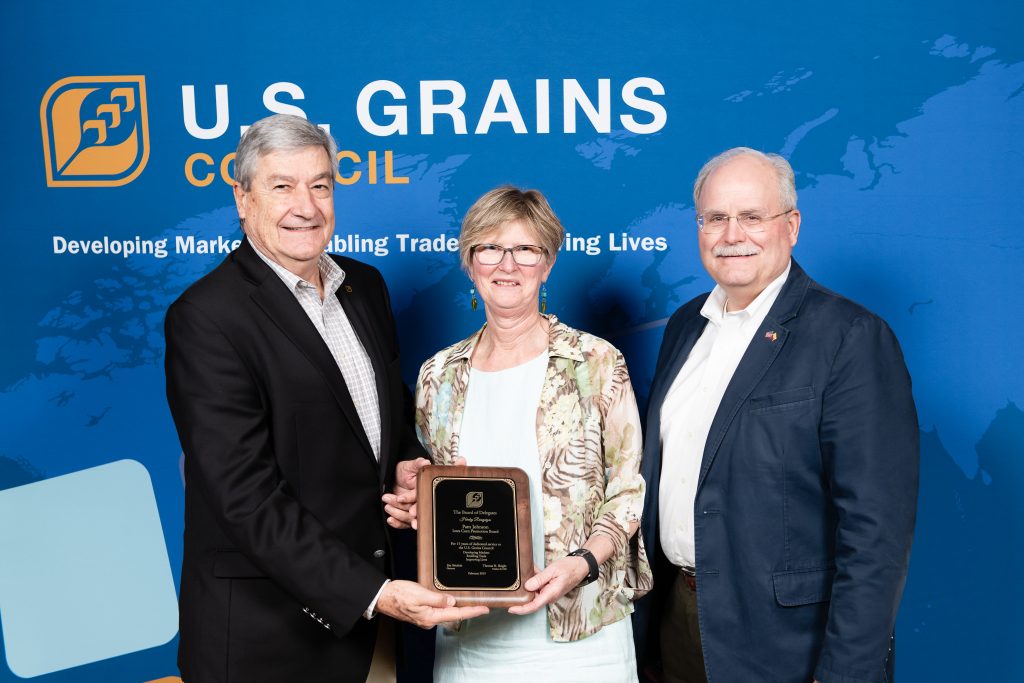Pam Johnson travels the world, sharing the perspective of farmers like herself with the World Trade Organization (WTO), the Food and Agriculture Organization (FAO) of the United Nations and countless delegations of ministry officials and overseas buyers for the corn she grows in Iowa. No matter the audience or the location, she emphasizes how much relationships matter – and how important it is for farmers to be engaged in building long-lasting markets.
“Being able to see with my own eyes and work with others to do things that really move the needle and make a difference, I would have to say there’s no more rewarding work than that,” Johnson said. “The power of the farm voice amazes me and encourages me to get more people involved because they can actually affect their own bottom line.”
The U.S. Grains Council (USGC) recognized Johnson for 15 years of service during the organization’s 16th International Marketing Conference and 59th Annual Membership Meeting earlier this year.
Johnson was first exposed to the Council following her election to the Iowa Corn Promotion Board in 2001. The next year, she joined a Pioneer mission, which took farmers to Russia and Hungary to learn about trade. At the time, Russia was a major importer of U.S. grains and host to a Council office. The Pioneer mission team toured farms, studied supply and demand and even met with the Russian minister of agriculture – all during a time of tense trade relationships between the United States and Russia.
“For me, the trip got me out beyond my farm gate to see how the world works and how important trade is to the U.S. farmer,” Johnson said. “So much has changed since then, but the things that don’t change are the work the Council farmers and staff do to build those relationships and adjust to markets around the world where our products are needed – corn, sorghum and barley.”
Later, Johnson would host trade teams from Russia and Hungary, among the first of many to visit her farm in Iowa, bringing the mission full circle.
“They thought it was really valuable to get out and talk to farmers that actually grow the crop and see with their own eyes what production looks like not only on the farm, but also down through the whole system, so they could understand how the supply chain works,” Johnson said.
As her leadership roles expanded with Iowa Corn, she became more heavily involved with both the Council and the National Corn Growers Association (NCGA). She was elected the first woman as president of NCGA in October 2012.
When the NCGA and Council officers traveled to Argentina, the group spent a lot of time talking about how growers in both countries were serious competitors, but they all shared a common problem with non-tariff barriers in global markets. From those conversations, MAIZALL – the international maize alliance – was established by Johnson, then USGC Vice Chairman Julius Schaaf and others.
“We came back and we had learned so much,” Johnson said. “If we can really work together on some of these issues, we would have much more of an impact.”
Johnson continues to work with MAIZALL, through which growers from the United States, Argentina and Brazil work shoulder-to-shoulder to address non-tariff trade barriers and encourage access to plant breeding innovations, crop protection products and more.
“Little-by-little, step-by-step, thousands of meetings – it just kind of comes together,” Johnson said. “Now, looking back at what we did together has been really unbelievable, but very rewarding. And the work continues.”
Johnson reiterated the opportunities and challenges will keep coming for farmers and global markets, meaning farmers need to continue to engage through organizations like Iowa Corn, NCGA and the Council.
“When I first started at Iowa Corn, I got hooked because the woman who called me said, ‘It’s the best work I’ve ever done with the best people I’ve ever worked with,’” Johnson said. “And that sums it up in a nutshell.
“I just feel so lucky that I’ve had the opportunity to be able to work with other people to make a difference and learn more about how the world works.”
More than any one of her many international experiences, Johnson emphasized farmer voices can engage from wherever they are located.
“It’s easy to wonder if the work you do on your farm or in your local community makes a difference, but it all does,” Johnson said. “You do not have to be out traveling the world, although you certainly can if you want to, but you can make a difference right where you are at home.”
About The U.S. Grains Council
The U.S. Grains Council develops export markets for U.S. barley, corn, sorghum and related products including distiller’s dried grains with solubles (DDGS) and ethanol. With full-time presence in 28 locations, the Council operates programs in more than 50 countries and the European Union. The Council believes exports are vital to global economic development and to U.S. agriculture’s profitability. Detailed information about the Council and its programs is online at www.grains.org.

